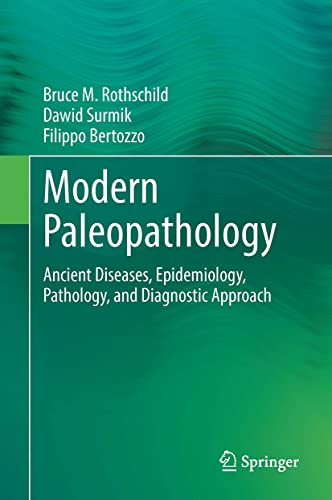
Free Download Modern Paleopathology, The Study of Diagnostic Approach to Ancient Diseases, their Pathology and Epidemiology: Let there be light, the light of science and critical thinking by Bruce M. Rothschild , Dawid Surmik , Filippo Bertozzo
English | PDF EPUB (True) | 2023 | 873 Pages | ISBN : 3031286235 | 58.6 MB
The study of paleopathology has two very different constituencies, the medical scientist and the zoologist/paleontologist/anthropologist. Their investigative procedures and professional jargon are different, sometimes to the point of mutual incomprehensibility. Paleontologists/anthropologists/zoologists have a limited data base for the characterization and interpretation of pathology. This must come from the human and veterinary medical experience.
What, beyond intellectual satisfaction, can the health care community expect from this relationship? The past history of the appearance and dispersal of infectious disease and cancer is of considerable theoretical importance and leads to new insights on the nature and transmission of diseases that are otherwise ambiguous. The discovery of rheumatoid arthritis in pre-Columbian North America exemplifies insights gained.
The current effort delineates osseous impact of disease (as manifest in clinical populations diagnosed in life), representation in the zoologic, paleontologic and anthropologic record, and assessment techniques that can be confidently applied. The chapters form "columns" that provide the foundation for scientific critical thinking. The actual integration of the information is in its application. Our purpose is to provide a data base and atlas of actually documented skeletal impact of diseases (as population phenomenon), an initial data base of reported skeletal pathology, and a methodology for expanding this to new arenas.
The first section of the book examines the scientific basis of paleopathology, its transition from speculation-based musings, resolution of misconceptions and the denouement of paleo-epidemiology. The second section provides holistic analysis of the gamut of pathology/diseases with significant skeletal impact, with a validated archeologic/zoological/paleontological record. The third section provides a glossary to resolve the semantic challenges inherent to interdisciplinary efforts. The fourth section provides an atlas of pathology representation in the fossil record. Ultimately, this book intends to present a scientifically-validated approach to recognition of disease in the archeological, zoological and paleontological record, superseding previous speculation-based offerings.
[/b]
